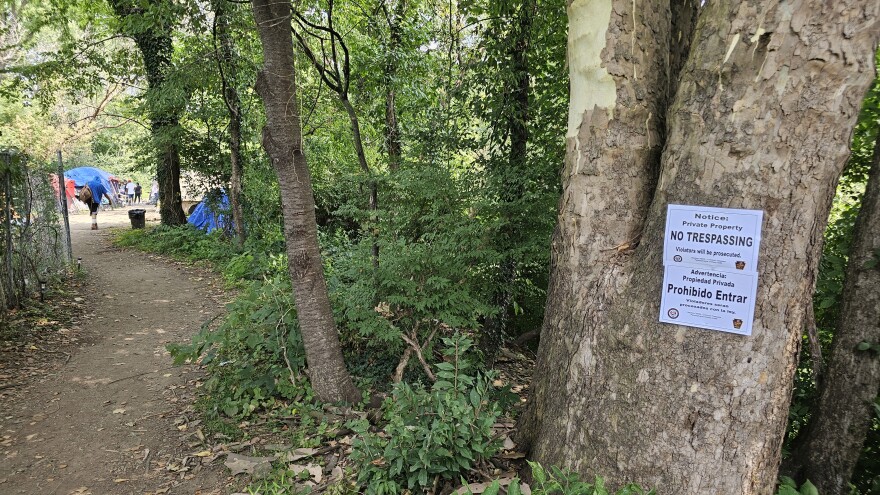ALLENTOWN, Pa. — Allentown officials and residents packed a room in City Hall on Wednesday to find solutions for more than 100 people living in a homeless encampment near Jordan Creek.
But the encampment still must be cleared by Aug. 25, according to Mayor Matt Tuerk.
City Council unanimously approved spending $25,000 from its budget — and Tuerk's office committed to contributing the same amount — to help Allentown YMCA open its warming shelter before its usual mid-November start.
YMCA officials are committed to opening early, Tuerk said, noting the $50,000 grant would cover about a month of its operations.
“If you can get it open early, I think that would help a lot of people."Jay Anderson, a resident of the homeless encampment
The mayor said he is seeking a similar contribution from Lehigh County officials and is talking to a philanthropic organization about filling any funding gaps.
Jay Anderson, a resident of the encampment, said the YMCA won’t be able to serve all the unhoused who live along the Jordan Creek, but said it’s a “lifeline” for some.
Council member Santo Napoli called the Y’s early opening the “fastest and best option” to help some of the camp’s residents ahead of its impending closure.
But many residents’ worries remain, as the warming shelter could struggle to open its doors before the Aug. 25 eviction deadline — even with funding.
'Safety and health is paramount': Mayor

City employees on Aug. 7 posted no-trespassing signs at the entrance to the encampment and handed notices to residents living there.
Many, including council, were caught off-guard by the mayor’s decision to shut down the camp after he previously directed Allentown workers to help clean up the camp rather than clear it.
Tuerk laid out a timeline for his decision. The mayor said he visited the camp ahead of the warming shelter’s spring closing in mid-April, when there were just a handful of people living there in tents.
He said he ordered city employees to “work compassionately and try to give people stability for as long as we can give them stability” by letting them continue living in the camp.
“We are entering hurricane season; we're entering a period of unpredictable weather and a period of extreme weather. We don’t want to put ourselves in a position where we’re fishing somebody out of that creek.”Mayor Matt Tuerk
Workers provided a dumpster and porta-potty as short-term amenities, with hopes that residents could live there until the Y reopened its shelter in mid-November.
But several water rescues in May — and a catastrophic flood that killed more than 100 people in Texas in July — prompted an Allentown deputy fire chief to analyze the safety of the camp, according to the mayor.
That analysis determined the camp was in a floodplain and posed a significant risk to residents.
“We are entering hurricane season; we're entering a period of unpredictable weather and a period of extreme weather,” Tuerk said.
“We don’t want to put ourselves in a position where we’re fishing somebody out of that creek.
“This is part of the challenge that we face in public service: We have to do things that are hard, but they're the right things to do,” he said.
He said residents’ “safety and health is paramount."
The official hurricane season for the Atlantic basin is from June 1 to Nov. 30, but tropical cyclone activity sometimes occurs before and after those dates.
The peak of the Atlantic hurricane season is Sept. 10, with most activity from mid-August to mid-October.
Safe camping, eviction extension?
Council on Wednesday also unanimously passed measures that give administration officials 30 days to figure out temporary shelter and implored Tuerk to extend the eviction date.
The mayor on Wednesday night said he'd consider the varied comments of council members and dozens of residents but would not “make a snap decision tonight” on an extension.
Tuerk asked council to authorize his administration to conduct a 60-day feasibility study on short-term solutions for residents of the encampment.
But Councilwoman Ce-Ce Gerlach and her colleagues gave him half that time to identify and acquire a parcel of land in Allentown where residents can legally and safely set up their tents.
“This is not going to fix the problem; none of this is going to fix the problem. We need housing.”Ce-Ce Gerlach, Allentown City Council
“Time is of the essence,” Gerlach said, She encouraged city officials to “take a leap of faith” and explore a safe-camping initiative like one launched last month in Harrisburg.
The capital city’s “Miracle Community” let people live in communal tents in a designated camp where the city provides essential services. It’s an effort to safely relocate people from an encampment nearby.
Meanwhile, state senators in Harrisburg — including some Lehigh Valley Democrats — are backing legislation that would make it easier for people living near such camps to force local governments to take action.
Senate Bill 780 would allow people living or owning property within 1,600 feet of a homeless camp to petition municipalities to identify it as a public nuisance.
That almost certainly would strengthen the position of landlord/developer Nat Hyman, who sued Allentown in April, alleging the homeless encampment along the Jordan Creek is hurting his neighboring properties.
Tuerk emphasized on several occasions Wednesday that his decision to shut down the camp had “zero to do with” Hyman’s lawsuit.
'Put our money where our mouth is'
Council wrapped up its talks about the homeless encampment after more than three hours, but not before Gerlach repeated the need for long-term solutions.
“This is not going to fix the problem; none of this is going to fix the problem,” Gerlach said. “We need housing.”
More than 100 people who crammed into council’s chambers — forcing Fire Chief Efrain Agosto to keep tabs on capacity — exited the room after council’s final vote on the encampment.
“Let’s look at the line items and see if we really put our money where our mouth is."Blake Henry, resident
That left city council free to quickly voice its support for measure to raise more than $130 million through bonds to pay for new headquarters for police officers, firefighters and EMTs, as well as new facilities for the parks and recreation department.
Resident Blake Henry earlier in the meeting pointed out the absence of funding in the bond proposal for any kind of shelter for homeless residents. He questioned Allentown officials’ priorities.
“Let’s look at the line items and see if we really put our money where our mouth is,” Henry said.


